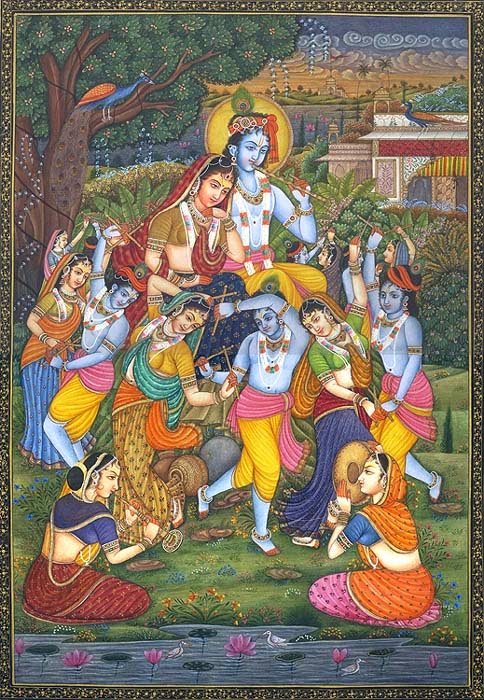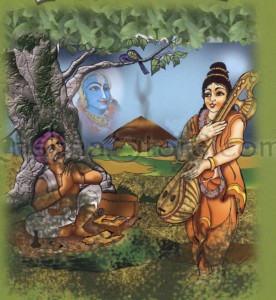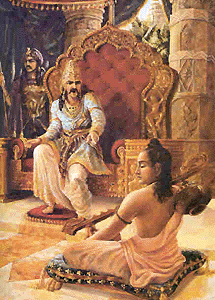Located about 400 meters southeast of Kusuma Sarovar, there is a sacred pond known as Narada Kund, dedicated to the great sage Narada Muni. According to the Vedas, Narada Muni, upon hearing from Vrinda Devi about the glories of the Rasa Dance and the nature of Gopi Bhava, developed a strong desire to serve Lord Krishna and Radharani in the form of a Gopi. With this desire, he received the Gopal Mantra from Lord Brahma and began his meditation.
After years of deep meditation, Narada was blessed by Yogamaya Purnamasi Devi. With her blessings, he took a dip in Kusuma Sarovar and attained the form of a Gopi, which qualified him to serve Lord Krishna. Seeing Narada in the form of a Gopi, Sri Krishna advised him to stay at Narada-vana, an Upvana (sub-forest) of Vrindavan, and write the Bhakti Shastra. Krishna also informed Narada that the curse of Daksha, which prevented him from staying in one place, would not apply in Vrindavan as it is not part of the material world.
Following Lord Krishna’s advice, Narada Muni decided to stay at Narada Kund, where he meditated and wrote his thesis on devotional service to God, known as the Narada Bhakti Sutra. Near the Kund, there is a small temple dedicated to Narada Muni.
The Story from Narada Purana, Skanda Purana, and Padma Purana
According to the Narada Purana (2.80.9-32), Skanda Purana (2.6.2-3), and Padma Purana (4.75.25-46), when Narada first heard that Lord Krishna had appeared in Vrindavana, he wandered through Vrindavana’s twelve forests looking for signs of his beloved Lord. With great intensity, he ran through the secret bowers where Krishna would meet the Gopis but could not find any evidence of Krishna’s appearance.
Vrinda Devi, a prominent Gopi who helps arrange Krishna’s rendezvous with His girlfriends, appeared before Narada and told him that to see such esoteric pastimes, he would have to adopt the mood and form of a loving Gopi himself. She said that this was possible only for the most advanced practitioners of spiritual life and that Narada was one such soul. She instructed Narada to bathe in a nearby pond known as Kusum Sarovara.
Narada followed Vrinda Devi’s instructions and emerged from the waters as a Gopi named Naradi. He could then see Vrindavana with new eyes and enter Krishna’s pastimes with the cowherd girls. Later, Vrinda Devi instructed him to bathe in another pond, which came to be known as Narada Kund, where he resumed his male form.
The Narada Purana teaches that the lesson from this episode is that even a sage as great as Narada must meditate on Vrindavana in the intense mood of a Gopi to attain the highest level of prema, or love for Krishna. Such meditation is possible only for the most accomplished devotees.
Narada Vana and Narada Bhakti Sutra
Narada Vana is near Kusuma Sarovara. It is said that Narada Muni wrote the Narada Bhakti Sutra here after being instructed by Lord Shiva to perform tapasya (penance). Narada desired to witness the conjugal pastimes of Radha and Krishna at Radha Kunda but could not do so because he was in a male body. The Bhakta Ratnakar recounts the story of Narada at this place.
After being blessed by Vrinda Devi, Narada took a female body after bathing in Kusuma Sarovara. He then witnessed the pastimes of Radha and Krishna at Radha Kunda. Krishna requested Narada to stay at Narada Vana and write Bhakti Shastras, informing him that the curse of Daksha would not apply in Vrindavan-dhama.
After another bath in Kusuma Sarovara, Narada returned to his male form and came back to Narada Kund, where he wrote the famous treatise on devotional service known as the Narada Bhakti Sutra. About 400 meters southeast of Kusuma Sarovara is Narada Kund, where there is a small temple dedicated to Narada Muni, maintained by friendly pujaris.
Narada’s Instruction to Prahlada Maharaja
It is also said that Narada Muni instructed Prahlada Maharaja here while Prahlada was still in the womb of his mother. This must have taken place in Vrindavan, where Daksha’s curse had no effect, allowing Narada to stay and impart divine knowledge to the future great devotee, Prahlada.


